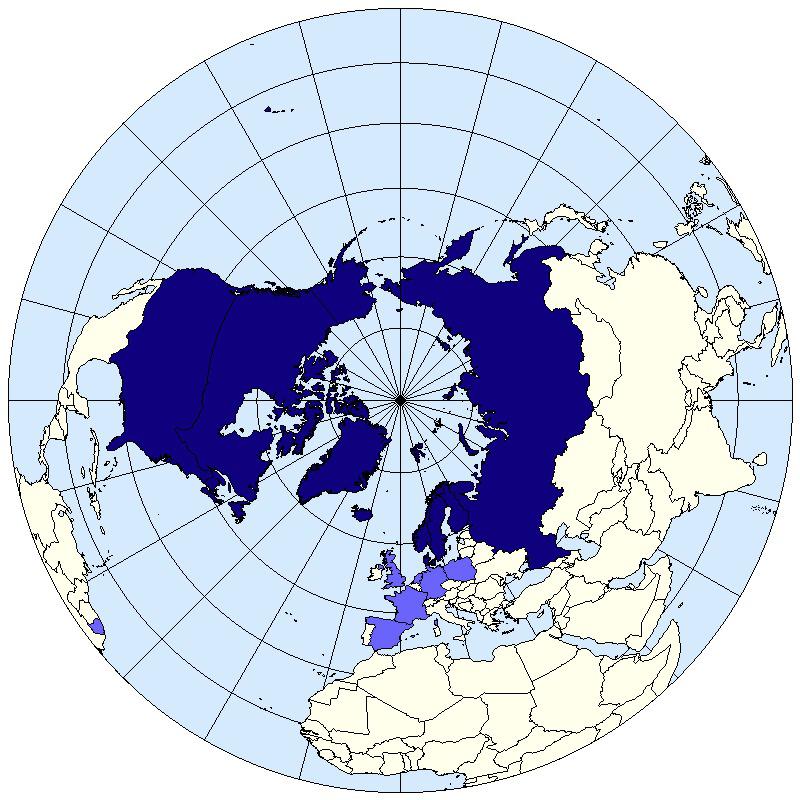The Cracking of the NWP Compromise A Sign of a Conflict to Come or Tempest in a Teacup?

Heather Exner-Pirot and Robert Huebert have different views on whether the US-Canadian relationship is under pressure.
Heather Exner-Pirot would not characterize the disagreement over NWP as a conflict at all. "Wishful thinking" is Robert Huebert's reply.
The 1988 compromise between USA and Canada over the rights to the Northwest Passage (NWP) appears to be cracking, as High North News reported last week.
But there are different opinions on whether to call this conflict or not. Not everyone is particularly concerned.
Heather Exner-Pirot, Managing Editor at the Arctic Yearbook and Research Associate, Observatoire de la politique et la sécurité de l'Arctique (OPSA) is one of them:
"There is a disagreement between Canada and the US over the legal status of the NWP but not what I would characterize as a conflict. It has been well managed - as you identify “an agreement to disagree” - for thirty years, and before".
She argues that the USA is not concerned with the NWP per se but with the principle of Freedom of Navigation and the precedent that acknowledging the NWP as internal waters could set for other key straits around the world.
"I am not sure what people think could happen with this – Canada and the US famously have the longest and most peaceful border and obviously as NATO members and free trade partners our interests are closely aligned. The NWP just isn’t that important to either to risk upsetting the relationship"

Managing Editor at the Arctic Yearbook
and/or
Research Associate, Observatoire de la politique et la sécurité de l'Arctique (OPSA, cirricq.org/opsa)
The NWP just isn’t that important to either to risk upsetting the relationship
She believes the worst-case scenario is that this makes the top of a diplomatic agenda.
"There is zero chance this turns into an actual conflict. This is so obvious that it is absurd to even have to write it down. We jointly monitor the North American Arctic through NORAD (North American Aerospace Defende Command).
Wishful thinking
Associate Professor Robert Huebert, at University of Calgary, Canada, call Exner-Pirot's statement "wishful thinking".
"This view limits the understanding of the conflict. This is not a dispute over arctic resources or other causes found in the Arctic but about the geopolitical importance and the developing rivalries of the great powers. Even if a narrative developed, throughout much of the Post-Cold War era, that the Arctic is an exceptionally peaceful and cooperative region, there are clear indications that important changes threaten to destroy this exceptionalism and marking the Arctic a location of increasing tension, he says to High North News.
In his new book, coming out within a couple of weeks, he argues that a New Arctic Strategic Triangle Environment (NASTE) has major ramifications for Canada.
Triangle of superpowers
What the Americans are responding to with this freedom of navigation act, is a core nuclear build up that has increased since 2014, according to Huebert
"First; Russia is actively reasserting great power status through hybrid warfare and political interference designed to undermine Western solidarity and democratic governance systems. Remember; Putin looks Joe Biden in the eyes and said that the old "friendship" between the West and Russia has ended and that Russia from now on was going to act independently".
The second factor is China is rising as a global actor.
"Officially, China’s interests in the Arctic are science, economy and shipping. But we know they have growing military capabilities and that they actively interfere in governance through cyber warfare and economic investments to secure strategic assets”

Rob Huebert, associate professor at the University of Calgary and a senior research fellow with the Centre for Military and Strategic Studies. (Credit: University of Calgary)
What the Americans are responding to with this freedom of navigation acts, is a core nuclear build up that has increased since 2014
The third part of triangle is the Trump Administration.
Advanced weapons
Huebert contends that the core strategic interests of Russia, China and United States are now converging at the top of the world.
“The Arctic is witnessing a new “great game” that is not about conflict over the Arctic but rather occurring through the Arctic. This does not make the threat any less dangerous, but it does make it more complicated”.
His explanation for this view is that the advances in new weapon systems with greater speed, range and reach are heightening the importance of the Arctic as a geostrategic space.
“For the Russians, placing the delivery systems in the Arctic remains one of the most effective geographic locations for launching against the United States in the event of conflict. Likewise the Arctic is also one of the best locations for the Americans to launch against Russia
Caught in the middle
And right there in the middle, lies Canada.
Professor Huebert says Canada’s problem lies in its geographic position in the middle of the resurgent power triangle between Russia, China, and the United States.
"Canada and its allies were fortunate in the 1990s, framing the Arctic as a zone of peace while Russia was too weak to act in the Arctic and China was relatively disinterested. These actors are no longer on the sidelines” Huebert says.
And underlines that the Arctic is not insulated from global drivers in terms of environmental security, social challenges, or geopolitics.
Huebert's main concern following his triangle theory is that someone one day will make a mistake.
"What happens if someone oversteps and fires a missile? That could turn into a deadly serious matter in a second and escalate really quickly".
Cannot see any actual conflict
Heather Exner-Pirot is familiar with Huebers theories and the triangle, but thinks it is hard to foresee any actual conflict.
"Over what, and where? Russia already has half the Arctic. All Arctic coastal nations have a hard time just providing basic stewardship and monitoring in their vast Arctic territories. The region is unexploited overall, so it is not as though they are competing for resources. The vast majority of resources are sitting there, in the Arctic coastal nations’ territories and in their 200 mile Exclusive Economic Zones, untapped, because they are mostly unprofitable right now. Certainly no need to fight for access to resources – all are willing to sell them for a profit, including to China. And several of them are actively trying to make themselves more attractive for shipping traffic, not deter it", she argues.
She does not believe the Chinese have ulterior motives, as suggested by Huebert.
"China does not have war fighting capabilities In the Arctic, which Huebert knows. Because they don’t need them. Their new icebreakers are to support shipping and exploration and research. The US are hardly investing any money into Arctic-specific defenses. Why? No doubt they have come to the conclusion that the threat of conflict is extremely low there. Also it’s a terrible, dangerous, expensive theatre in which to conduct military activities"

US Secretary of State Mike Pompeo has several times mentioned that China is not even a “near-Arctic state”. (Map from the Arctic Council).
Arctic geopolitical realities leave Canada with the risk of sleepwalking into an increasingly dangerous Arctic security environment
Exner-Pirot warns against aggressive political rhetoric on all sides, but says this can best be explained by the desire for domestic political gain.
"And nationalism and bravado in the Arctic seem to provide that, especially for Russia and to a lesser extent Canada".
End of an era
Huebert is concerned after hearing the Navy secretary repeatedly claiming freedom of navigation for shipping in Arctic waters.
"All of these leaders continue to speak this language. A language we have never heard before. And the question is: will they do it? That will be so damaging".
He says Donald Trump does not believe in the "special relationship" between the US and Canada over the NWP.
"But until now, neither have wanted to push the issue. And they have managed it so far, in a sophisticated way. But with president Trump at the table, we have an administration that only sees things in a win-lose environment. Donald Trump does not see the 1988 agreement as a compromise, but as the US not getting their way.
He emphasizes that Canada and the US have to work together through NORAD.
"But how can we cooperate if the the US challenges Canada on its core sovereignty” he asks himself.
“Despite normative hope for a peaceful Arctic, Arctic geopolitical realities leave Canada with the risk of sleepwalking into an increasingly dangerous Arctic security environment because most commentators still hope that the Arctic remains an area of low tension”.
I think the stability and good cooperation in the Arctic Council and the Arctic region speaks to the benefits of the current approach
Robert Huebert is not confident that the Arctic Council will help to address his concerns.
"The Arctic Council is passive om these hard security issues. The council is an important confidence builder, but to build confidence it takes two parts" he argues.
Huebert finds it hard to explain how the AC can be confident that Russia will behave in the Arctic, while it is aggressive elsewhere, for example in Ukraine and the Baltic states.
"Geography alone does not get people to behave. How do you explain the conflicts in Ukraine and the Baltic, and the constant interference in Norwegian airspace", Huebert asks.
Discussed bilaterally
The Arctic Council explicitly does not address military issues as per the 1996 Ottawa Declaration establishing the Arctic Council.
Heather Exner-Pirot has written about how this is a net benefit for cooperation as AC activities could continue largely unaffected by broader geopolitical issues. In this sense the AC and the Arctic are ‘compartmentalized’.
"However there is no doubt that Arctic states address these issues bilaterally and within the context of more appropriate venues for the situation, e.g. NATO, the EU or the G8" she adds.
Exner-Pirot says there is no advantage for having the Arctic Council be the only forum for these discussions
"Or even a forum, and certainty they do take place elsewhere. I think the stability and good cooperation in the Arctic Council and the Arctic region speaks to the benefits of the current approach", she sums up.
Must be addressed
Professor Robert Huebert, at the University of Calgary, finds it absolutely necessary for Canada to throw away the mindset that the Arctic is an area of "exceptional peace".
"This requires a shift in Canadian thinking from tactical cognition to deeper and broader strategic awareness before the Arctic security environment gets really nasty.
"Also we need a new fighter and an arctic offshore patrol vessel. And we have to get the radar systems up there so we have the ability to respond if something happens. It will not happen right now. Or tomorrow. But we have more than one example in history where things seemed to be completely normal just days before a big crisis escalated".
We have more than one example in history where things seemed to be completely normal just days before a big crisis escalated".

